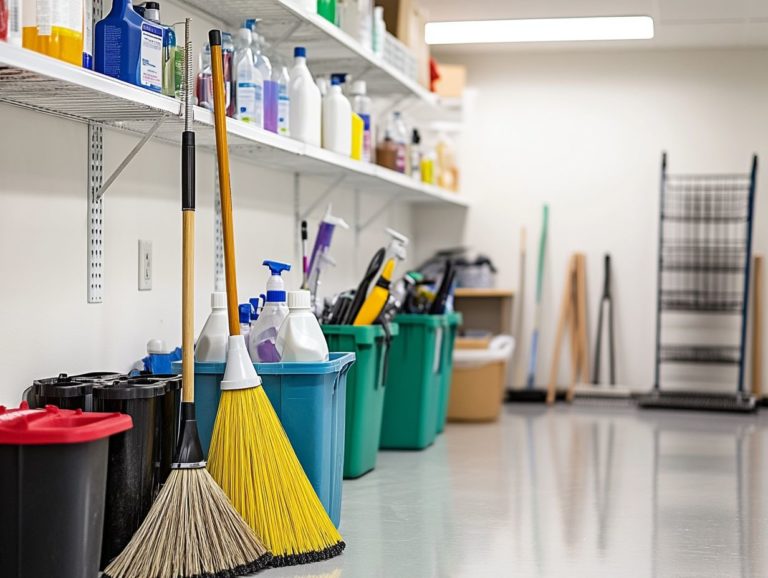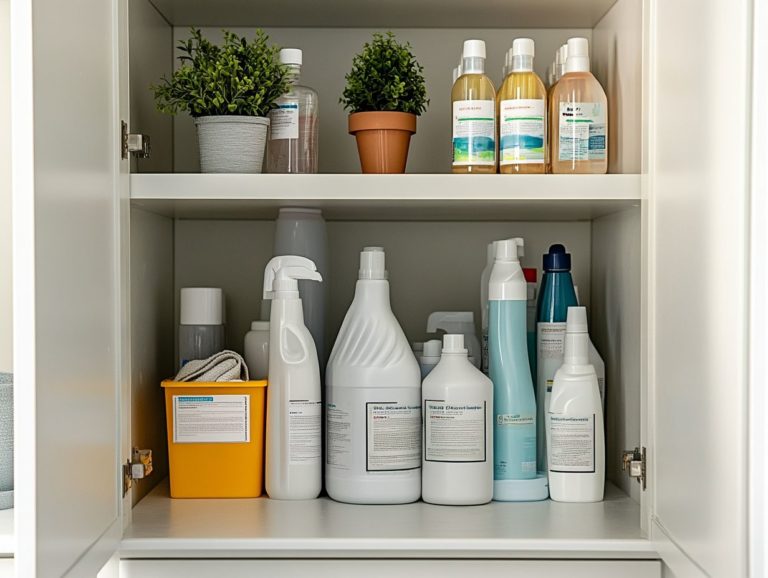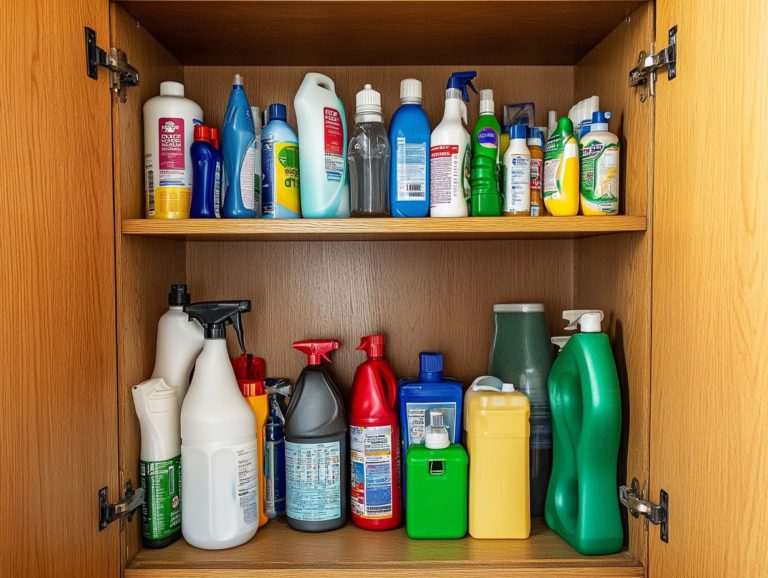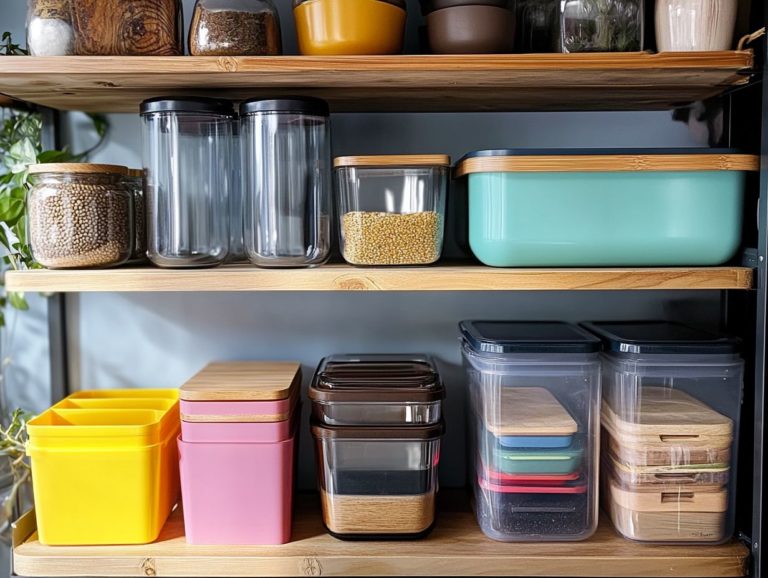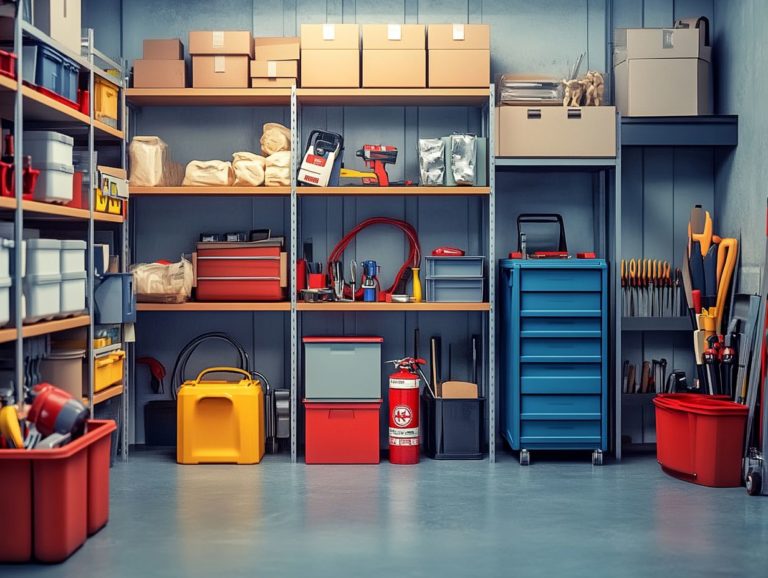How to Store Cleaners for Long-Term Use
Proper storage of your cleaning products is crucial for preserving their effectiveness and ensuring safety within your clean home.
With a wide array of cleaners at your disposal, ranging from chemical formulations to natural alternatives, grasping the nuances of proper storage for each type can significantly extend their shelf life and mitigate potential hazards.
Delve into the best practices for storing both chemical and natural cleaners, familiarize yourself with the signs that indicate when they have expired, and discover essential tips for responsible disposal. Explore innovative storage and organizing tips for cleaning enthusiasts.
Equip yourself with the knowledge to keep your cleaning supplies both safe and effective! Optimize your space with clever storage solutions for easy access.
Contents
- Key Takeaways:
- Why Is Proper Storage of Cleaners Important?
- What Are the Different Types of Cleaners?
- How to Store Chemical Cleaners for Long-Term Use?
- How to Store Natural Cleaners for Long-Term Use?
- What Are the Signs of Expired Cleaners?
- Dispose of Expired Cleaners the Right Way!
- Frequently Asked Questions
- Can I store my cleaners for long-term use?
- What is the best way to store cleaners for long-term use?
- Do different types of cleaners require different storage methods?
- What should I do before storing my cleaners for long-term use?
- How long can I store my cleaners before they expire?
- What should I do if my cleaners have expired?
Key Takeaways:
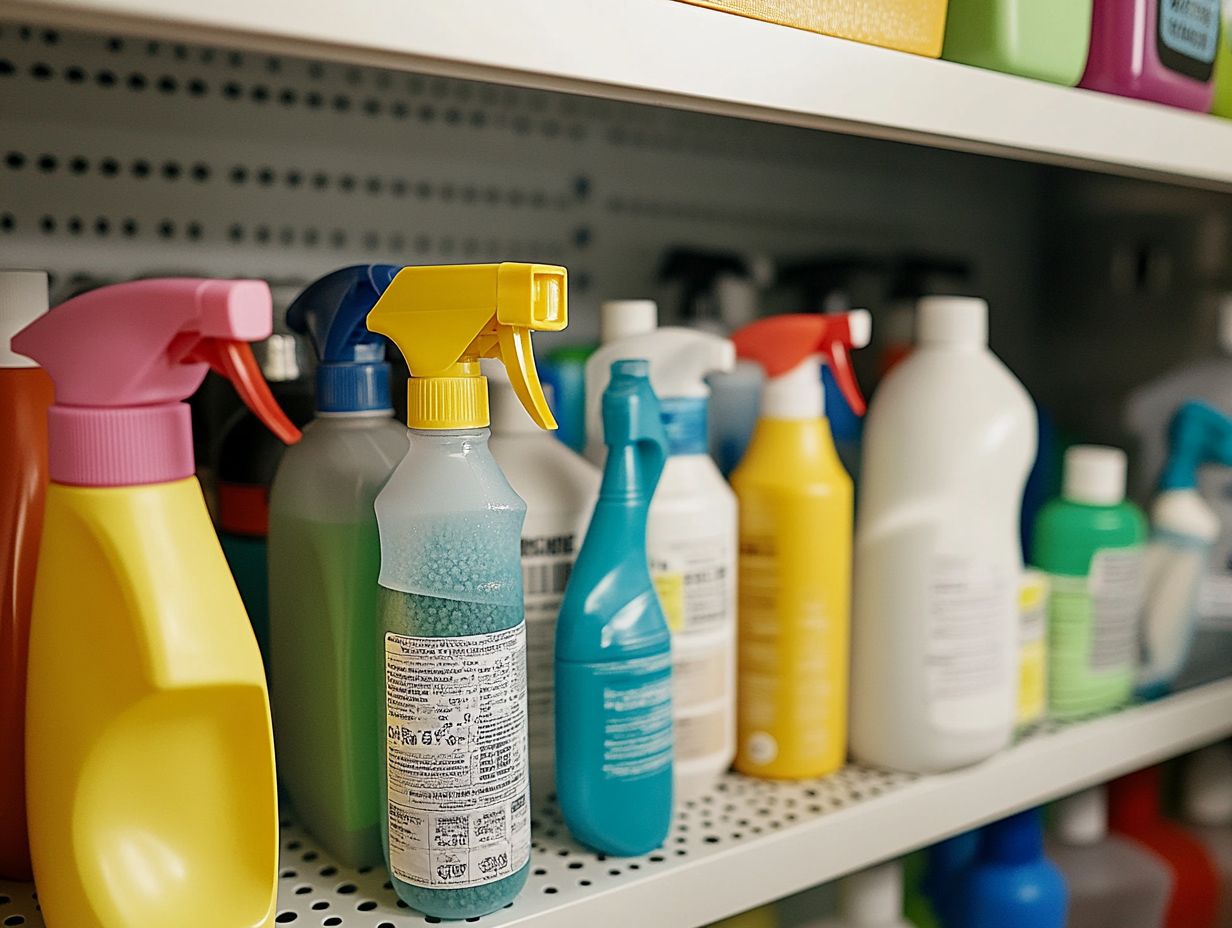
- Proper storage of cleaners is important for long-term effectiveness and safety.
- Chemical cleaners should be stored in their original containers, in a cool and dry place, away from sunlight and heat, and never mixed with other cleaners.
- Natural cleaners should be stored in airtight containers, in a dark and cool place, properly labeled and dated, and kept separate from chemical cleaners to avoid contamination. Consider using a lazy Susan a rotating tray often used in cabinets for better organization.
Why Is Proper Storage of Cleaners Important?
Proper storage of your cleaning supplies is crucial for maintaining a pristine home while ensuring both safety and effectiveness. When you store these products incorrectly, you open the door to potential hazards, such as accidental spills, unwanted access by children or pets, and less effective due to heat or light.
Organizing your cleaning supplies enhances accessibility and prevents clutter. This promotes a proactive approach to keeping your space tidy during cleaning tasks. Mastering the art of creating functional storage systems for your cleaning items is essential, whether you re a cleaning professional or an enthusiastic homeowner. Incorporating items like clear bins, over-the-door organizers, and utility carts can make a significant difference.
What Are the Different Types of Cleaners?
Understanding the different types of cleaners is essential for effective results. Cleaners can be categorized into chemical cleaners and natural cleaners, each with unique benefits.
Different cleaners serve different purposes. For instance, kitchen cleaners tackle tough grease, while bathroom cleaners focus on mold and mildew. Knowing what each cleaner does helps you choose the right tool for the job.
1. Chemical Cleaners
Chemical cleaners are specially formulated with synthetic ingredients that tackle tough stains, grime, and germs. They are a preferred choice for cleaning enthusiasts. Think about bathroom and kitchen cleaners loaded with bleach and ammonia, all designed for a deep clean.
Using these cleaners can raise safety concerns, especially in homes with children or pets. It’s important to handle and store them with care.
Know the necessary cleaning tools to use these products safely. Adhere to specific usage instructions and safety guidelines to minimize risks.
Wear gloves and masks to protect your skin and lungs while cleaning. Store products in a cool, dry place, out of direct sunlight, and out of children’s reach.
Consider using a removable tension rod under the sink for hanging spray bottles and other cleaning products. This keeps everything organized and accessible.
The right tools, like microfiber cloths or scrub brushes, make a significant difference in cleaning effectiveness. Be aware of potential hazards like fumes and chemical burns to ensure a safer cleaning environment.
2. Natural Cleaners
Natural cleaners are gaining popularity as eco-friendly alternatives to chemical cleaners. They use ingredients like vinegar, baking soda, and essential oils for effective cleaning.
These solutions are often seen as safer choices for your home, especially if you have young children and pets. Despite their gentle nature, they can effectively clean when used correctly.
Proper storage is crucial for maintaining their effectiveness, including using safety locks on cabinets. Natural cleaners are pet-friendly and can tackle grime easily.
For example, vinegar’s acidic properties break down mineral deposits and grease, while baking soda acts as a gentle abrasive. Essential oils not only smell great but also have antibacterial properties, enhancing your cleaning routine.
Store natural solutions in dark glass containers to protect sensitive oils from light. Always keep them out of children’s reach, and be sure to label your homemade cleaners to prevent mix-ups.
How to Store Chemical Cleaners for Long-Term Use?
Proper storage of chemical cleaners is essential for keeping them effective and ensuring safety. Always keep these products in their original containers as they are designed for protection and provide important safety information.
Implement effective storage solutions, such as cleaning caddies and labeled bins. Use vertical space to streamline access and minimize safety concerns.
Proper organization keeps harmful products out of reach of children and pets, significantly reducing the risk of accidental exposure.
1. Keep Them in Their Original Containers
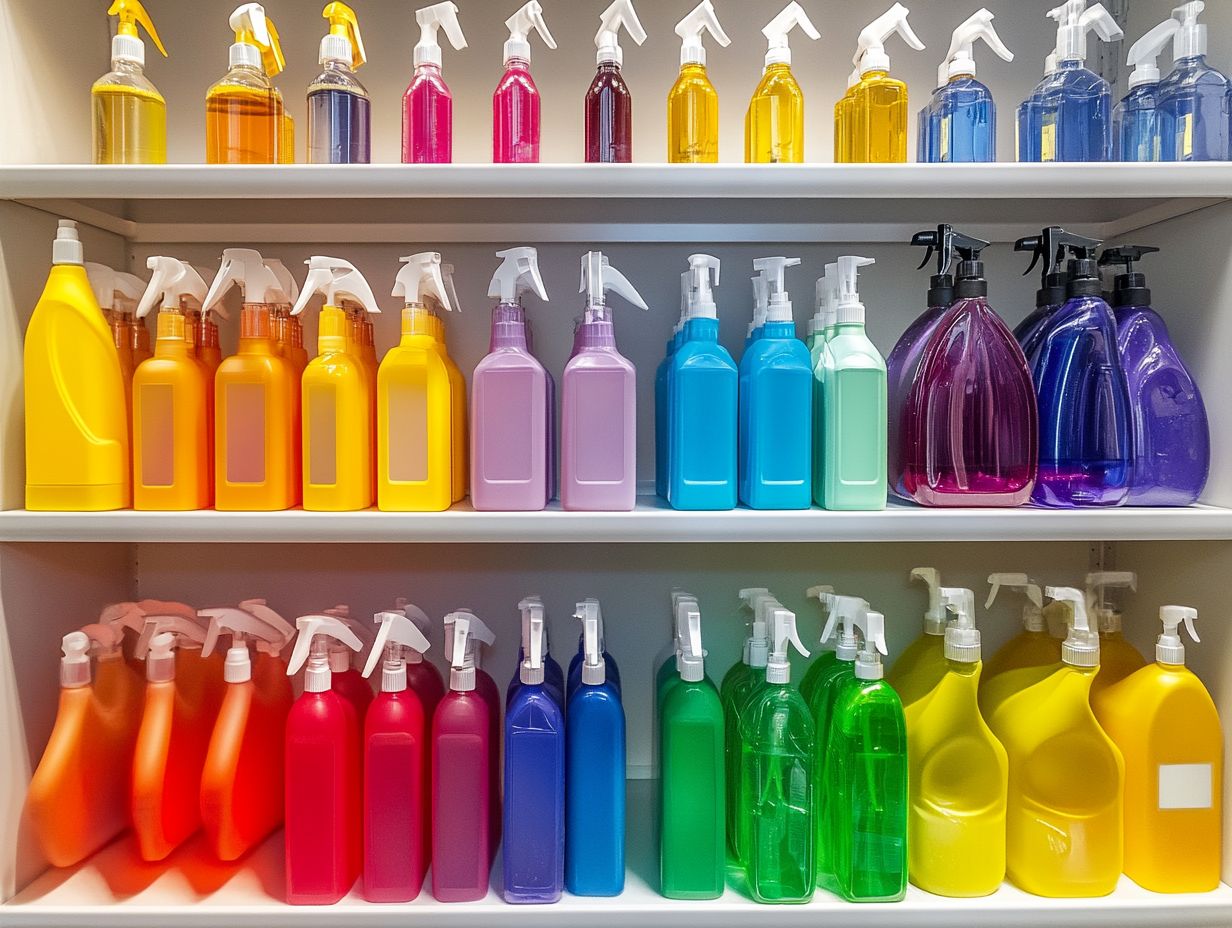
Keeping chemical cleaners in their original containers is crucial for your safety and the effectiveness of the products. These containers are thoughtfully designed to prevent leaks and provide essential safety information. Follow the manufacturer s instructions, which are conveniently labeled on the containers.
Utilize safety locks on cabinets that house these cleaners to prevent unauthorized access, especially in homes with children or pets. Grab an over-the-door hanging storage now to maximize your space!
Proper storage keeps your cleaners effective and safe! It significantly reduces the risk of dangerous chemical reactions that may occur if products are mixed improperly. The labels often contain important information, such as expiry dates and specific storage conditions, which are vital for ensuring that the products remain effective and safe to use.
Keep these strong cleaners away from heat sources and direct sunlight to preserve their composition. By designating a dedicated storage area and maintaining an organized inventory, you can quickly identify potential hazards, fostering a safer environment for everyone in your home.
2. Store in a Cool, Dry Place
Store your chemical cleaners in a cool, dry place to maintain their potency and prevent degradation. Exposure to heat and moisture can compromise the effectiveness of these products, which not only reduces their cleaning power but can also create potential safety hazards.
Adopt thoughtful storage solutions, such as designating a specific utility closet or cabinet space, to keep your cleaning supplies in optimal condition for long-term use. Choose a storage spot away from direct sunlight to prevent UV exposure from degrading certain chemicals.
Organize your cleaners by type and purpose to maximize your available space. This makes it easy to locate specific items when you need them. If you have young children or pets at home, install child-proof locks on your cabinets to enhance safety.
Using clear pockets on the inside of cabinet doors can help keep smaller items organized. By considering these factors, you ensure that your collection of cleaners remains effective, safe, and ready for action whenever the need arises. Incorporate a cleaning schedule to maintain regular upkeep and minimize clutter.
3. Keep Away from Sunlight and Heat
To maintain the effectiveness of your chemical cleaners, keep them away from direct sunlight and heat sources. Exposure to sunlight can degrade essential ingredients, while heat can increase pressure in containers, posing risks of leaks or even explosions.
Prioritize storage in dark, temperature-controlled areas to enhance the longevity of your cleaning solutions while ensuring safety. For detailed insights, consider maintaining cleaners through safe storage. Recognize that fluctuations in temperature can impact the chemical composition of these products, leading to reduced potency or altered reactions upon use.
Ideal storage conditions include cabinets away from direct light, basements, or climate-controlled garages. For added organization, use labeled bins and clear baskets to keep everything in its place.
Consider using storage containers that are opaque or dark-colored to further limit light exposure. Be mindful not to place cleaning supplies near ovens or heaters; the consistent warmth can have detrimental effects over time.
By implementing these straightforward yet effective storage strategies, you can significantly extend the lifespan and maintain the efficacy of your cleaning solutions.
4. Avoid Mixing Different Cleaners
Don’t mix different chemical cleaners. This can cause hazardous reactions that produce toxic fumes or create dangerous situations.
Many cleaning products contain powerful ingredients that can react negatively when combined, raising serious safety concerns. For example, when you combine bleach and ammonia, you create toxic chloramine vapors, which can irritate your respiratory system and pose significant health risks.
Similarly, mixing vinegar and baking soda may seem innocent, but it can result in a rapid release of carbon dioxide gas, causing pressure to build up if contained in a closed space.
Keep yourself safe by storing cleaning products separately and always reading labels for ingredient information. Establish a well-organized system that keeps products that shouldn t be stored together apart. Use labeled bins, cleaning caddies, and vertical space to maximize storage efficiency.
How to Store Natural Cleaners for Long-Term Use?
For long-term use, it’s crucial to store natural cleaners in airtight containers. Clear bins and labels help organize cleaning supplies effectively. This practice preserves their effectiveness and prevents contamination.
Natural cleaners tend to be more sensitive to environmental factors like air and moisture, which can break them down over time. Labeling and dating containers allows you to keep track of freshness, ensuring you use the most effective cleaning solutions available. For more tips, check out our guide on how to store cleaners in a family home. Consider using a cleaning schedule to rotate your products regularly.
1. Store in Airtight Containers
Storing your natural cleaners in airtight containers is essential for preserving their effectiveness. When exposed to air, these cleaners can break down, leading to a significant reduction in their cleaning power. By using airtight containers, you protect the integrity of your cleaning solutions and prevent contamination from external sources.
When selecting containers, choose high-quality options that provide a reliable seal. Using clear baskets and acrylic trays can also help organize supplies efficiently.
- Consider materials like glass or food-grade plastic. These offer durability and are less likely to leach harmful substances. Functional systems like over-the-door hanging storage can save valuable cabinet space.
- Glass jars with silicone seals are excellent at keeping out moisture and air, while BPA-free plastic containers are lightweight and shatter-resistant.
- Opting for dark-colored containers can also protect light-sensitive ingredients.
As you store your cleaners, label each container clearly with its contents and the date of preparation. This step helps you stay organized and ensures you use your products in a timely manner. By taking these precautions, you can significantly enhance the longevity and effectiveness of your natural cleaning products. Consider adding a removable tension rod for organizing spray bottles and other cleaning tools in your utility closet.
Take these steps today to ensure your cleaning products stay effective and safe, including following a guide to storing natural cleaners safely!
2. Keep in a Dark, Cool Place
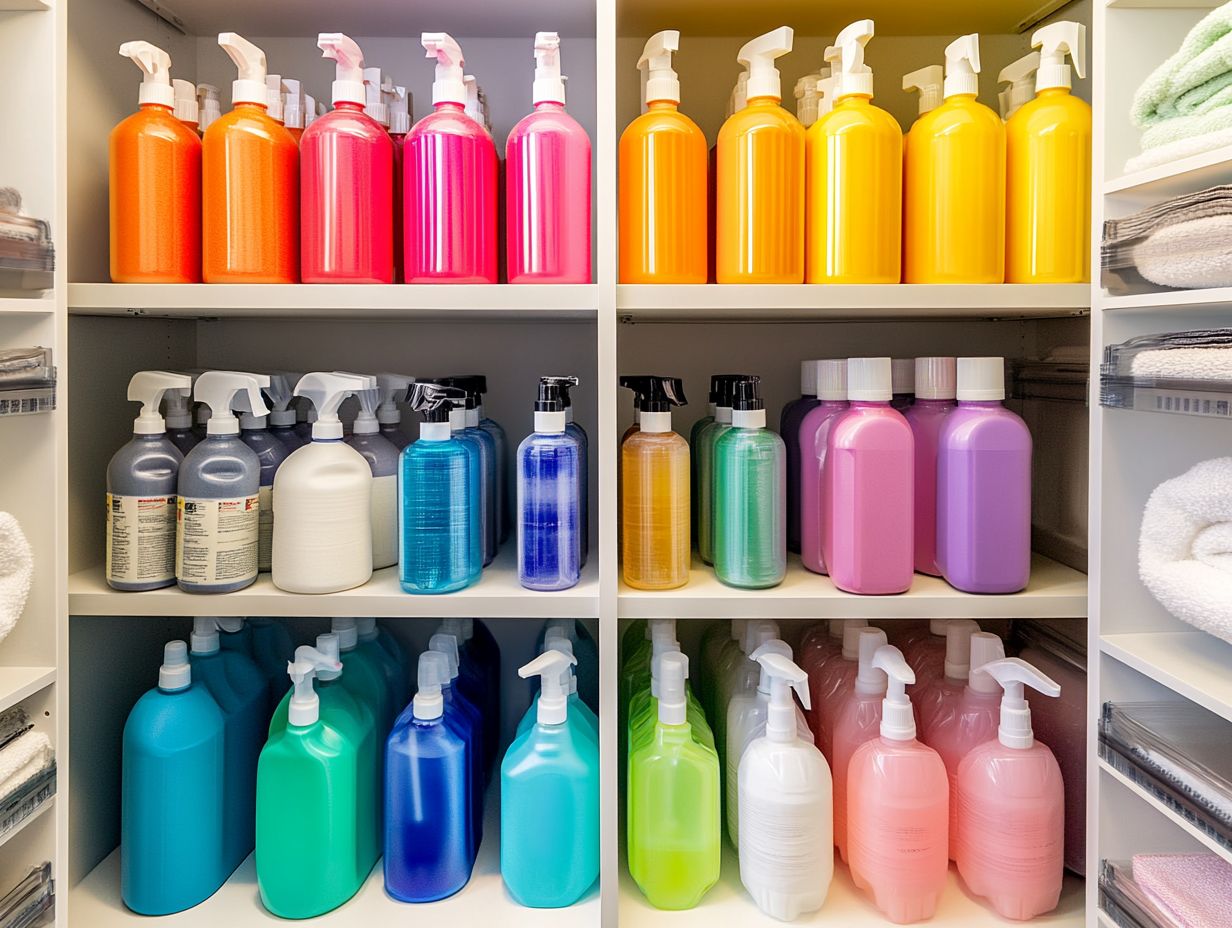
Keeping your natural cleaners in a dark, cool place is essential to protect them from heat and light, which can degrade their active ingredients. Ideal storage spots include utility closets or cabinets. By shielding them from environmental exposure, you’re not just enhancing their longevity; you’re also boosting their cleaning power.
Choosing the right location for these products is crucial. Long exposure to sunlight and fluctuating temperatures can compromise their efficacy. Use opaque containers these block light, keeping your cleaners effective and label them clearly to avoid mix-ups with non-natural products. An organized cleaning supply station saves you time when searching for the right product.
Avoid storing them under the sink, where humidity from pipes can create an unstable environment. Instead, aim for higher shelves in your pantry or laundry area. Additionally, consider storing cleaners safely during summer. These proactive measures will maximize the shelf life of your cleaners and maintain their potency, ensuring your cleaning routine is both environmentally friendly and effective.
3. Label and Date the Containers
Labeling and dating your containers of natural cleaners is essential for their effectiveness and freshness. Clearly marking each container with its contents and the date of preparation or purchase allows you to track their age and make informed decisions about their use. This practice minimizes the risk of using expired cleaning products.
Freshness is crucial for natural cleaners, as their potency can wane over time. Use proper labeling practices to manage your cleaning arsenal effectively, ensuring that each product operates at its peak performance.
4. Avoid Contamination with Chemical Cleaners
Avoid chemical cleaners at all costs! They can ruin your natural products. Mixing these two types of cleaning products can lead to unpredictable reactions and diminish the effectiveness of the natural solutions you rely on.
Establish careful storage practices by designating specific areas for your natural cleaners, separate from chemical ones. Clearly label your containers and regularly check for leaks or spills to enhance safety.
Use child-proof locks to keep storage areas safe from curious kids and pets. Ensure that anyone using these products understands the potential dangers associated with mishandling or mixing cleaners. By taking these thoughtful precautions, you can fully enjoy the benefits of effective cleaning with natural products without compromising safety or performance.
Start organizing your cleaning supplies today to maintain a clean and safe home!
What Are the Signs of Expired Cleaners?
Recognizing the signs of expired cleaners is essential for maintaining a pristine home and ensuring that your cleaning processes are effective. Look out for common indicators, such as any noticeable change in color or texture, like separation or clumping, which often signals that the product has lost its potency. Decluttering tips from cleaning professionals like Mary Cornetta or Andrea Brame can help you manage your supplies better.
Detecting an unpleasant odor is a clear sign that the cleaning product has expired. Regularly checking the condition of your cleaning supplies is vital to guarantee that they remain safe and effective for your use.
1. Change in Color or Texture
A noticeable change in color or texture can be your first clue that a cleaner has expired and is no longer up to the task. For instance, if you notice a liquid cleaner separating or becoming cloudy, it s often a sign that its ingredients have broken down, rendering it ineffective for your cleaning needs.
Make it a habit to check your cleaners regularly! Consulting with cleaning professionals like Benjamin Ottis from Full Color Cleaners can provide additional insights on maintaining the quality of your products. Take bleach, for example; it may turn yellow or develop a pungent odor when it s past its prime. Not only does this compromise its cleaning power, but it can also pose safety risks.
Surface sprays or multipurpose cleaners might show signs of expiration through changes like thickening or sediment buildup. By recognizing these visual and textural cues, you can ensure that the cleaners you use in your home remain effective and safe, ultimately promoting a healthier living environment.
2. Unpleasant Odor
An unpleasant odor wafting from your cleaner is a clear indication that it may have expired and should be set aside. Over time, the ingredients in cleaning solutions can break down, leading to foul smells that signal a loss of effectiveness and potential safety concerns.
These odors could indicate the presence of harmful chemicals that might pose health risks, particularly when inhaled in confined spaces. Cleaning tips from experts like Laura Avila from Nashville Maids can be invaluable when dealing with such issues. To mitigate these risks, check your cleaners before use and dispose of any that emit unusual scents.
When it comes to disposal, contact your local hazardous waste services for safe disposal. If you re unsure about the proper disposal methods, checking the manufacturer’s guidelines is a smart move.
Ultimately, being mindful of when your cleaning supplies expire and ensuring their safe disposal boosts your cleaning effectiveness and prioritizes the health and safety of everyone using them. Regularly integrating cleaning tips from cleaning professionals can enhance your cleaning methods.
3. Ineffective Cleaning
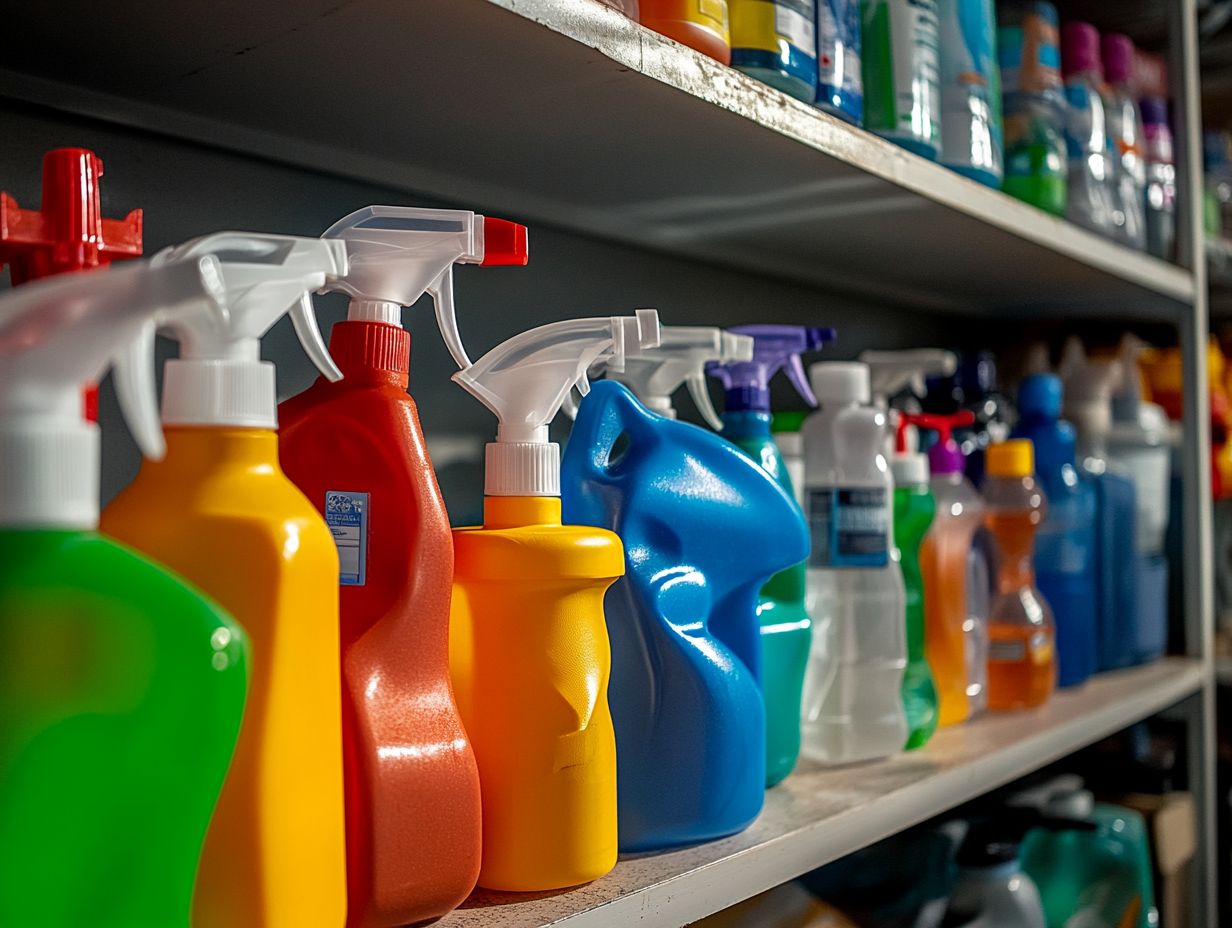
Ineffective cleaning often indicates your cleaner may have lost its potency. If a product can no longer tackle dirt, stains, or odors as effectively as it once did, it s likely that its main cleaning agents have broken down and are no longer functional. Regularly evaluate the performance of your cleaning products to avoid expired cleaners and ensure a consistently effective cleaning process. Using multi-purpose cleaners can simplify your cleaning tasks!
To assess effectiveness, consider the specific tasks each product is designed for, whether it s removing grease from kitchen surfaces or tackling bathroom mold. For example, kitchen cleaners are formulated for grease, while bathroom cleaners target mold specifically. If a cleaner takes longer to show results or requires multiple applications where it used to need just one, that s a red flag!
Pay attention to the texture and scent of the product! If a liquid has thickened or developed an unpleasant odor, it’s a strong sign it may have passed its prime. Regularly check expiration dates to ensure your products work effectively. Organize your supplies in clear bins or a cleaning caddy for easier access and management.
Dispose of Expired Cleaners the Right Way!
Properly disposing of expired cleaners is essential to prevent safety hazards and safeguard the environment. Many cleaning products contain chemicals that can pose risks to both your health and the planet if not disposed of correctly. Follow specific disposal methods, such as taking them to a hazardous waste facility (a facility designed to safely handle dangerous substances) or adhering to local disposal guidelines. Consulting cleaning professionals like Mary Cornetta or Benjamin Ottis can provide additional insight into proper disposal methods.
Additionally, use up any remaining product before it expires whenever possible to minimize waste! Reading the labels on your cleaning products can provide critical information regarding safe disposal instructions. For more detailed guidance, check out how to store the most common household cleaners. Some communities host periodic collection events for hazardous materials, making it easier for you to responsibly discard unwanted cleaners. Consider decluttering tips and organizing tips from experts like Laura Avila to maintain a tidy system.
It s also wise to explore eco-friendly alternatives that are less harmful to the environment! This can alleviate disposal concerns in the future. By engaging in these best practices, you not only promote your personal safety but also contribute to the broader cause of environmental stewardship. Implementing cleaning organization strategies from stores like The Container Store can aid in maintaining an efficient and eco-friendly home.
Frequently Asked Questions
-
Can I store my cleaners for long-term use?
Yes! You can store your cleaners for long-term use as long as you follow proper storage methods. Investing in vacuum storage solutions and safety locks can help maintain the integrity of your household cleaners.
-
What is the best way to store cleaners for long-term use?
The best way to store cleaners for long-term use is in a cool, dry place away from direct sunlight. Utilizing vertical space and hanging storage options like S-hooks and bungee cords can maximize your cabinet space efficiently!
-
Do different types of cleaners require different storage methods?
Yes! Different types of cleaners may require different storage methods. It s important to read the instructions on the label for specific storage recommendations. Incorporating clear pockets and acrylic trays can help keep your cleaning tools and products organized.
-
What should I do before storing my cleaners for long-term use?
Before storing your cleaners, clean their containers and cap them tightly to prevent leaks or evaporation. Consider using labeled bins and clear baskets for added organization. Following cleaning schedule guidelines can also help maintain functional systems!
How long can I store my cleaners before they expire?
The expiration date of cleaners depends on the specific product. Always check the label for the recommended shelf life.
Spring cleaning can help you track when your products expire and keep things organized.
What should I do if my cleaners have expired?
If your cleaners have expired, dispose of them safely! It’s important to follow local regulations to keep your home safe.
You can get more disposal advice from cleaning professionals like Andrea Brame and Nashville Maids.

